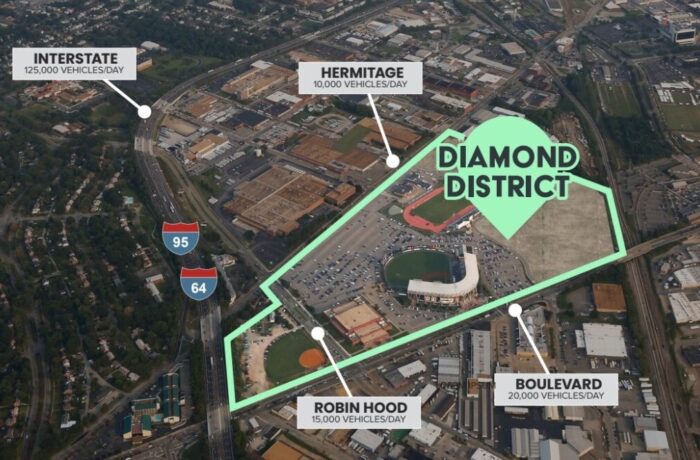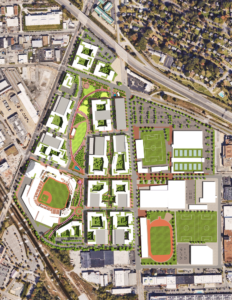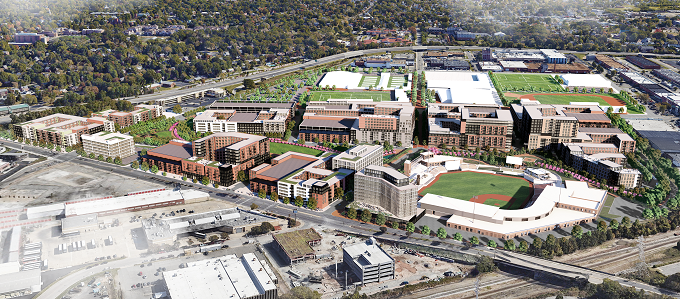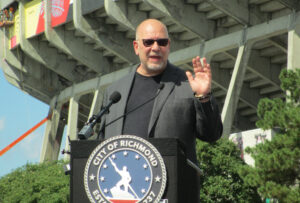Administrators’ pitch to change the city’s approach to financing its massive Diamond District development appeared to land receptively with Richmond City Council on Monday.
Council members expressed support for the plan to have the city issue its own lower-interest revenue bonds to fund the project’s anchor ballpark for the Richmond Flying Squirrels and initial infrastructure improvements. Doing so is expected to save $215 million in debt costs over the previous plan to issue the bonds through a community development authority (CDA).
While the city would be responsible for any downside on the debt under the new plan, councilmembers agreed that the risk is outweighed by the project’s benefits and chances for success, given the parties involved and the momentum of the Scott’s Addition area it’s in.
“I really feel like this is a good option for us to move forward on this, because starting over would be a nightmare,” Council President Kristen Nye said following administrators’ presentation.
“I do not love using the city’s financial backing on the project. However, to me, with the community support, with the Squirrels being as popular as they are, and with our housing needs and all the housing that this project is going to be…to me, this is a calculated risk,” Nye said.
In addition to reducing the debt costs by a third, from $314 million with the CDA approach to $110 million over the 30-year bond terms, issuing its own bonds allows the city to secure them sooner. That would make them eligible for a state sales tax incentive program that’s expected to provide $24 million for the project. The city says it can secure the bonds in June, before the program’s anticipated July 1 sunset.
The change in strategy appears to be revving up a project that’s been relatively quiet over the past year, with needed steps such as the CDA’s creation yet to be completed. The city is aiming to break ground on the new ballpark in June and complete it in time for the 2026 season, to comply with facility standards for pro baseball venues that cannot be met with the existing Diamond stadium.
The new approach was welcomed by executives with the Flying Squirrels ballclub and Minor League Baseball, who lauded the move in a release put out by the city.
“Today’s announcement by the city represents an important step toward ensuring that the Squirrels will have a new home in Richmond,” Flying Squirrels President Lou DiBella said in the release. “April 2026 is just around the corner, so it is imperative that all stakeholders move forward collectively and with a sense of urgency.”
Added Morgan Sword, executive VP for baseball operations for MiLB: “Richmond has been a great market for minor league baseball, and we’re excited to see that the city is making progress on putting in place a plan to keep baseball in Richmond for years to come. We think today’s developments are an important step forward to ensuring that the new stadium will be ready in time for the 2026 season.”
With the bonds secured in June, the city would sell the land to the developers for the project’s first phase, parts of which have grown in size during the design phase along with the new ballpark.
Deputy Chief Administrative Officer Sharon Ebert said Monday that the planned footprint for the 10,000-seat ballpark has been increased to allow more parking for the team and the 360-degree fan experience sought by the Squirrels. She said an adjacent central park that would serve the larger development is now planned to drop in size, from 11 acres to 8.
Current designs also would allow for more residential units, which along with retail development and a 180-room hotel would support the stadium by generating tax revenue that would pay for the bonds through a tax increment financing (TIF) approach. Total investment in the first phase is projected at $627 million.

The Diamond District site consists of 67 acres bordered by Arthur Ashe Boulevard, Hermitage Road, the interstate and the railroad tracks. (BizSense file)
With a CDA no longer needed, the new approach would also free up adjacent taxable properties that had been planned to be included in the CDA’s TIF district, which had been expanded beyond the 67 acres that make up the project site. Under the new plan, those surrounding properties would continue to generate taxes for general city services.
The city said issuing the bonds would not impact its debt capacity and would free up nearly $24 million of debt capacity that had been programmed for the infrastructure improvements. Ebert emphasized that assuming the bond debt would not affect the city’s ability to issue bonds for other capital improvement projects such as schools.
“This is much more cost-effective,” said Ebert, who also addressed the risk to the city should the project fail to produce the projected revenues.
“There is risk; I don’t want to say that there isn’t any risk,” she said. “Taking this approach does require the city to put its full faith and credit behind the bond if the tax revenues don’t materialize as expected.”

A bird’s eye view of the envisoned Diamond District development and VCU Athletic Center across Hermitage Road.
Such a scenario would put the city on the hook for $7 million in annual debt payments, Ebert said.
But, with Flying Squirrels attendance expected to increase, with the involvement of a known developer in Thalhimer Realty Partners and with the Scott’s Addition area expected to keep booming, she added, “It is with that confidence that we are recommending that we should put the city’s full faith and credit behind these city-issued special revenue bonds.”
Ebert acknowledged the tight timeframe faced by the city, caused in part by the upheaval in capital markets from the rapid rise in interest rates since the project was first proposed.
“The reason why it’s taken us so long has been the economic climate over last year. It was never-ending trying to catch up with the inflation and how we were going to deal with that, but we are now prepared to move forward.”
Ordinances reflecting the new financing approach, as well as changes to the development team led by Thalhimer and Loop Capital, were introduced at council’s regular meeting Monday and are to be voted on at an upcoming meeting.
Councilwoman Ann-Frances Lambert questioned various details about the project and the new agreements, including whether previous agreements with Republic Properties, which had led the development team but is not included in a new entity with Thalhimer and Loop, have been resolved.
Councilwoman Katherine Jordan, whose district includes the Diamond District site, lauded the project’s design and progress to this point, noting Thalhimer’s involvement on the local level.
“One of the reasons among many that we went with the Thalhimer team was because there were going to be twists and turns that we were not going to be able to forecast, and I believe strongly that when you have a local partner, they just have so much buy-in and commitment to seeing it through despite what challenges might come along,” Jordan said.
“We have got to get shovels in the ground,” she added. “It’s very concerning that the sales tax was going to sunset, and we’ve made a commitment to build this ballpark, on a deadline that was imposed to us that we’re already really on the edge of.”
Administrators’ pitch to change the city’s approach to financing its massive Diamond District development appeared to land receptively with Richmond City Council on Monday.
Council members expressed support for the plan to have the city issue its own lower-interest revenue bonds to fund the project’s anchor ballpark for the Richmond Flying Squirrels and initial infrastructure improvements. Doing so is expected to save $215 million in debt costs over the previous plan to issue the bonds through a community development authority (CDA).
While the city would be responsible for any downside on the debt under the new plan, councilmembers agreed that the risk is outweighed by the project’s benefits and chances for success, given the parties involved and the momentum of the Scott’s Addition area it’s in.
“I really feel like this is a good option for us to move forward on this, because starting over would be a nightmare,” Council President Kristen Nye said following administrators’ presentation.
“I do not love using the city’s financial backing on the project. However, to me, with the community support, with the Squirrels being as popular as they are, and with our housing needs and all the housing that this project is going to be…to me, this is a calculated risk,” Nye said.
In addition to reducing the debt costs by a third, from $314 million with the CDA approach to $110 million over the 30-year bond terms, issuing its own bonds allows the city to secure them sooner. That would make them eligible for a state sales tax incentive program that’s expected to provide $24 million for the project. The city says it can secure the bonds in June, before the program’s anticipated July 1 sunset.
The change in strategy appears to be revving up a project that’s been relatively quiet over the past year, with needed steps such as the CDA’s creation yet to be completed. The city is aiming to break ground on the new ballpark in June and complete it in time for the 2026 season, to comply with facility standards for pro baseball venues that cannot be met with the existing Diamond stadium.
The new approach was welcomed by executives with the Flying Squirrels ballclub and Minor League Baseball, who lauded the move in a release put out by the city.
“Today’s announcement by the city represents an important step toward ensuring that the Squirrels will have a new home in Richmond,” Flying Squirrels President Lou DiBella said in the release. “April 2026 is just around the corner, so it is imperative that all stakeholders move forward collectively and with a sense of urgency.”
Added Morgan Sword, executive VP for baseball operations for MiLB: “Richmond has been a great market for minor league baseball, and we’re excited to see that the city is making progress on putting in place a plan to keep baseball in Richmond for years to come. We think today’s developments are an important step forward to ensuring that the new stadium will be ready in time for the 2026 season.”
With the bonds secured in June, the city would sell the land to the developers for the project’s first phase, parts of which have grown in size during the design phase along with the new ballpark.
Deputy Chief Administrative Officer Sharon Ebert said Monday that the planned footprint for the 10,000-seat ballpark has been increased to allow more parking for the team and the 360-degree fan experience sought by the Squirrels. She said an adjacent central park that would serve the larger development is now planned to drop in size, from 11 acres to 8.
Current designs also would allow for more residential units, which along with retail development and a 180-room hotel would support the stadium by generating tax revenue that would pay for the bonds through a tax increment financing (TIF) approach. Total investment in the first phase is projected at $627 million.

The Diamond District site consists of 67 acres bordered by Arthur Ashe Boulevard, Hermitage Road, the interstate and the railroad tracks. (BizSense file)
With a CDA no longer needed, the new approach would also free up adjacent taxable properties that had been planned to be included in the CDA’s TIF district, which had been expanded beyond the 67 acres that make up the project site. Under the new plan, those surrounding properties would continue to generate taxes for general city services.
The city said issuing the bonds would not impact its debt capacity and would free up nearly $24 million of debt capacity that had been programmed for the infrastructure improvements. Ebert emphasized that assuming the bond debt would not affect the city’s ability to issue bonds for other capital improvement projects such as schools.
“This is much more cost-effective,” said Ebert, who also addressed the risk to the city should the project fail to produce the projected revenues.
“There is risk; I don’t want to say that there isn’t any risk,” she said. “Taking this approach does require the city to put its full faith and credit behind the bond if the tax revenues don’t materialize as expected.”

A bird’s eye view of the envisoned Diamond District development and VCU Athletic Center across Hermitage Road.
Such a scenario would put the city on the hook for $7 million in annual debt payments, Ebert said.
But, with Flying Squirrels attendance expected to increase, with the involvement of a known developer in Thalhimer Realty Partners and with the Scott’s Addition area expected to keep booming, she added, “It is with that confidence that we are recommending that we should put the city’s full faith and credit behind these city-issued special revenue bonds.”
Ebert acknowledged the tight timeframe faced by the city, caused in part by the upheaval in capital markets from the rapid rise in interest rates since the project was first proposed.
“The reason why it’s taken us so long has been the economic climate over last year. It was never-ending trying to catch up with the inflation and how we were going to deal with that, but we are now prepared to move forward.”
Ordinances reflecting the new financing approach, as well as changes to the development team led by Thalhimer and Loop Capital, were introduced at council’s regular meeting Monday and are to be voted on at an upcoming meeting.
Councilwoman Ann-Frances Lambert questioned various details about the project and the new agreements, including whether previous agreements with Republic Properties, which had led the development team but is not included in a new entity with Thalhimer and Loop, have been resolved.
Councilwoman Katherine Jordan, whose district includes the Diamond District site, lauded the project’s design and progress to this point, noting Thalhimer’s involvement on the local level.
“One of the reasons among many that we went with the Thalhimer team was because there were going to be twists and turns that we were not going to be able to forecast, and I believe strongly that when you have a local partner, they just have so much buy-in and commitment to seeing it through despite what challenges might come along,” Jordan said.
“We have got to get shovels in the ground,” she added. “It’s very concerning that the sales tax was going to sunset, and we’ve made a commitment to build this ballpark, on a deadline that was imposed to us that we’re already really on the edge of.”







“While the city would be responsible for any downside on the debt under the new plan…”
“April 2026 is just around the corner, so it is imperative that all stakeholders move forward collectively and with a sense of urgency.”
Wasn’t he a former NY boxing promoter? Some holders stakes are bigger than others.
It’s barely mentioned in this article, but the design shown is quite different, and far worse, than the initially approved one. The street network is less pedestrian friendly, there is less variation in building types, the parking is less skillfully integrated, the public space design is worse, and the blocks are more generic and clumsy. The development is still a big improvement on what is there now, but it’s disappointing to see these changes, and also to see that the actual design of the development is barely part of the conversation.
This question is in good faith so I apologize if it comes off as antagonistic, but where did you see that the street network is less pedestrian friendly? I can’t tell that from the recent renders.
As for the park, personally I am okay with a reduction to 8 acres, especially if that means another dense residential building can be packed in. Also I have more faith in a smaller park/walkway being successfully maintained.
Thank you for the questions Ted. One of the main issues I see with this is that the number of streets have been reduced (from four cross streets to three on the west side of the park and five down to three on the east side. A finer grain of street grid is always easier to walk around. The small street leading north across Robinhood Road in the original is no longer a real street. The small square to the south east was reduced and is now encircled by only two buildings with one path leading through. This is going… Read more »
Thank you for the thoughtful response. You’ll certainly brook no argument from me on “going higher”, I truly hope that when the real thing happens we get quite a few buildings taller and with more variation than what is shown. Overall I am still quite happy with the direction, especially now that things are getting moving, but I think the things you’ve suggested would make it even better.
Appreciate it Ted. If only the internet was always like this!
Don & Ted – add me to the group 100% in favor of taller buildings. Richmond is land-locked, prohibited by law from expanding the way most of our chief competitor cities can (i.e. annexation), the only direction for growth is to go vertical. In looking at the updated renderings, that’s my primary disappointment – a relative lack of height. I was hoping we’d have a bit more – but the dynamics that make taller construction doable in cities like Charlotte, Austin, Nashville, Raleigh, etc., simply don’t exist here. Either way, I wouldn’t mind a bit more variation in the construction… Read more »
Well, the City froze out the big deep pocketed non-local players…. Maybe people are beginning to open their eyes to what the history of this entire chapter of leadership is about and not about. Getting things done is certainly not what they are about. Probably all majored in “Political Science” in college. The ONLY thing people should be focusing on is the fact that nothing has gotten done yet, when if they just did the modest, wise and intelligent thing, there would already be a lot of thriving buildings there and tax $$$ flowing into city coffers for them to… Read more »
Yes sir, totally agree with you.
I firmly disagree – the prior rendering had an unnecessary amount of open space. This rendering looks a lot more like Durham and less like West Broad Village. The open space is proportionally urban which is to say its more appropriate to the amount of development planned.
Send out to Lowe’s for some shovels.
I leave the details of real estate finance to those who are involved in it daily but this seems to be a good move on the City’s part. Although it has exposed its taxpayers somewhat, the fact that the ballpark has two major tenants in hand gives me some comfort. The location for Thalhimer’s success in building a mixed use center is another driver. This will work.
The deal keeps getting worse and nothing has been done — it could all be done years ago if the city just did the wise thing.
Exactly.
Yeah what a deal taxpayers will borrow general obligation funds to pay VCU $25M for SportBackers Stadium and in turn VCU will give us, over 30-year lease $15M back. Sound about right for government math. PS anyone SEEN the actual leases now since the CDA will not be the landlord. The Squirrels still committed to $2M-$3M payment to the City???
Thalhimer just leveraged the City against this project. Wasn’t not making the City obligated the reason for selecting them in the first place ? Now they’re being congratulated for putting the City on the hook for multiple millions of dollars in debt? And the response from City council is well we need this debt and the debt structure looks great ! When in actuality they’re already having financing trouble with the project.
Mater class in the ol’ bait and switch.
Although you are correct, it’s the City that wants to keep the ballpark at this location and it’s the rising cost of that ballpark that’s been the albatross in getting this deal financed properly. The capital markets have changed a lot since the developer selection was made and any of the competitors would be back to renegotiate with the City. If the ballpark was ignored, the City could have sold this site off in tranches for $3 Million per acre. Yeh, about $200M. Its still a great location and the result is that we’ll have a very versatile venue for… Read more »
You just can’t say what is obvious, can you? I’ve been thumping the tub for years before this deal that the idea of a new ballpark should be scrapped and the land sold to the best and highest bidder and let them decide how the land should be best used and have the city only put limited restrictions on what can be built and how. But the types of people running the city are not the types that have a well run city but are better at screwing things up. “Let’s get the shovels out” — sounds inspiring, but also… Read more »
Yes
Shawn is correct that I have cared less about locating a Double A team within City limits and thought that the ballpark belonged in the suburbs. However, the City has been adamant about its propriety of the club at this location. The mixed use concept is working to pay the bills and the ballpark will have two tenants. I withdraw my dissent. Let’s get started. I also support the growth of VCU as a public university within the City and all that that brings to us culturally. If that entails a loss here and there, it’s worth the investment.
I certainly support the growth of VCU or any other entity that wishes to invest money to expand. What I oppose is bad management from the city and this idea that a money-losing ego thing has to be prioritized to the degree that it puts us in the red. Even from City Hall’s supposed concerns about the poor in Richmond this makes zero sense, and when considering Richmond as a whole it also makes very little sense at all. The books I have read on the subject of the economics of stadiums could be wrong, but I believe what I… Read more »
Bruce how do you know its use will be versatile; have you seen the SIGNED lease. The uses and revised agreements have all been released to the public then?
Thank you for being brave enough to point out the obvious.
There were some huge national players who wanted to do big things here, and City hall chose some local, connected small fry for …. some reason.
My guess (and I’m only an armchair observer on this) – is that the big, national players who know how to do this stuff the right DID indeed want to do some big things here. Problem is, legitimately big things come with legitimately big price tags, and even ignoring the skyrocketing cost of the ballpark, I have little doubt that the overall price tags likely were WAY above what a city and market this size can afford, regardless of how financing is structured and who’s on the hook for what. So flip it around: the local-yokals likely were much more… Read more »
Hmmmm… could be. My eyes popped on some of the names of some of the heavy hitters that were interested —- and then City Hall, in all their wisdom, went with the local guys. There may be other reasons than just “Real Virginian” conservatism. As far as the ballooning costs, I’ll do you one better. I’ve heard of this little thing, that sometimes, very rarely, happens with estimated costs: The higher costs go even higher when the thing is actually built….. not that that ever happens when govt is involved, and it certainly never happens when a clearly incompetent or… Read more »
Thank you.
Fleece the taxpayers so that the Mayor can say that he got some shovels in the ground.
How about sell the land at a profit and let the market decide if a stadium is a best use for the location? Or not.
Right! If anyone thinks this project cannot fail, then look east to Norfolk and Google MacArthur Square Mall. Another project too big, too glamorous to fail.
But that was only a shopping center. Not an already successful ball team. Demographics were all wrong in Norfolk for MacArthur to last. It was great while it lasted. It just could not be sustained.
I will say that the Squirels are definitely more successful than the Braves — but that doesn’t mean that the city should build them a stadium. As far as I can see, the city of Norfolk did not build the MacArthur, and the deed has been transferred several times. If the bldg is worth something, it seems Norfolk could be picking up a good deal, since I read they are considering buying it for just 18 million dollars. It has a nice parking garage, at least, even if the mall costs more to keep open than to close, there is… Read more »
I was just in MacArthur Mall. I first have to say that I have no opinions about Norfolk’s leadership, I just don’t know about them and I don’t know the details about this site — did the city spend a tons of money to make that mall happen? It IS a nice mall, nicer than most, and I see from an article that it was a LONG DELAYED use of the land, so, even if they had just built the mall earlier it would’ve done better. Now, as my daughter said after glancing at the H&M sale dresses, “I can… Read more »
This deal will either screw taxpayers long term with increase debt spending on a stadium (a want) versus all the needs in the city like schools, road, sidewalks, etc. OR just ensure that the real estate (and other taxes) in the City remain the highest in the region for the next 30 plus years. It will be funny when, in say 15 years, this stadium has expired, no longer meets some update MLB requirements, and we have to pay again with more bonds before this one is paid off. Also, it is beyond comical to now claim how much in… Read more »
I think it’s worth doing, but there is no doubt the city has wretchedly mismanaged the process. Which is standard when it comes to building anything, up to and including a shed, in the city.
I think things are getting better, or maybe hope, but they are still pretty bad
Things are getting better in SPITE of City Hall, but do not underestimate their power to kill any golden gooses and asked to be thanked for it. I don’t think this is worth doing as-is — govt has a greater ability than most other entities to ignore realities, esp if they feel like the voters are clueless or disinterested enough, and when taxes go up and the people who knew better all along leave (I’ve seen this before) they are usually long gone and can’t be held accountable anyway for the higher taxes, lost opportunities, economic stagnation that they are… Read more »
The Flying Squirrels are ultimately owned by the San Francisco Giants. The Giants had net profits last year of $74.6 million. Why is a city like Richmond with few spare resources offering below-market financing to a highly profitable professional sports team? If Richmond is really such a great market for minor-league baseball and the stadium is a really good idea, why does the project need the city’s subsidized financing to make money?
I hate to break it to you, but the Squirrels are not owned by the Giants. The Squirrels are owned by APEX Systems founder and CEO Brian Callaghan, who is based here in Richmond. He is an alum of Virginia Tech. The Squirrels are affiliated with the Giants. Regarding this affiliation, Wikipedia notes: “The Flying Squirrels have been affiliated with the Giants since 2010, making it the longest-running active affiliation in the Giants organization among teams not owned by the Giants.” With possible MLB expansion on the horizon, there’s always the chance that, for example, Nashville, could be chosen, opening… Read more »
Aha.
Perhaps there is local connection
Does he donate to anyone?
The Squirrels are not in any way owned by the Giants. DiBella’s group owns the Squirrels and they have a player development contract with the Giants.
No argument with your other points.
Every city subsidizes its ball teams venues from single A to the MLB teams. This isn’t unique to Richmond. Henrico is even financially backing a tenant-less $250M arena just north of the City. Recently, the Governor tried ( and failed) to get the state to finance a $2B plan to bring major league hockey and basketball to Alexandria and is still working on a bigger price tag to bring the NFL Commanders south on I-95. No study yet has shown that the ball teams bring in the promised revenue long term but it does provide marketing advantages for corporate growth… Read more »
Well, if being a great sports town was a big draw, I guess Pittsburgh and Indianapolis would be like NYC and Los Angeles. Two of the football teams that call themselves “NY” are actually in NJ, if I recall correctly — the one football team is in… Buffalo…. I think Albany has Arena Football — it is actually more exciting than regular football, but I don’t think it has ever done well for localities. As far as marketing advantages go, I think that marketing dollars just tend to go to the paths of least resistance — sometimes sports games seem… Read more »
The headline of this article is correct. The construction of the ballpark needs to begin ASAP if they want to meet the April 2026 deadline. There are still material shortages, and labor shortages that have to be considered as well as the final cost, which is anybody’s guess.
If they want any possibility of meeting the deadline.